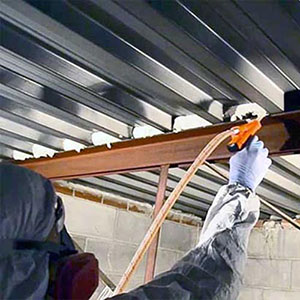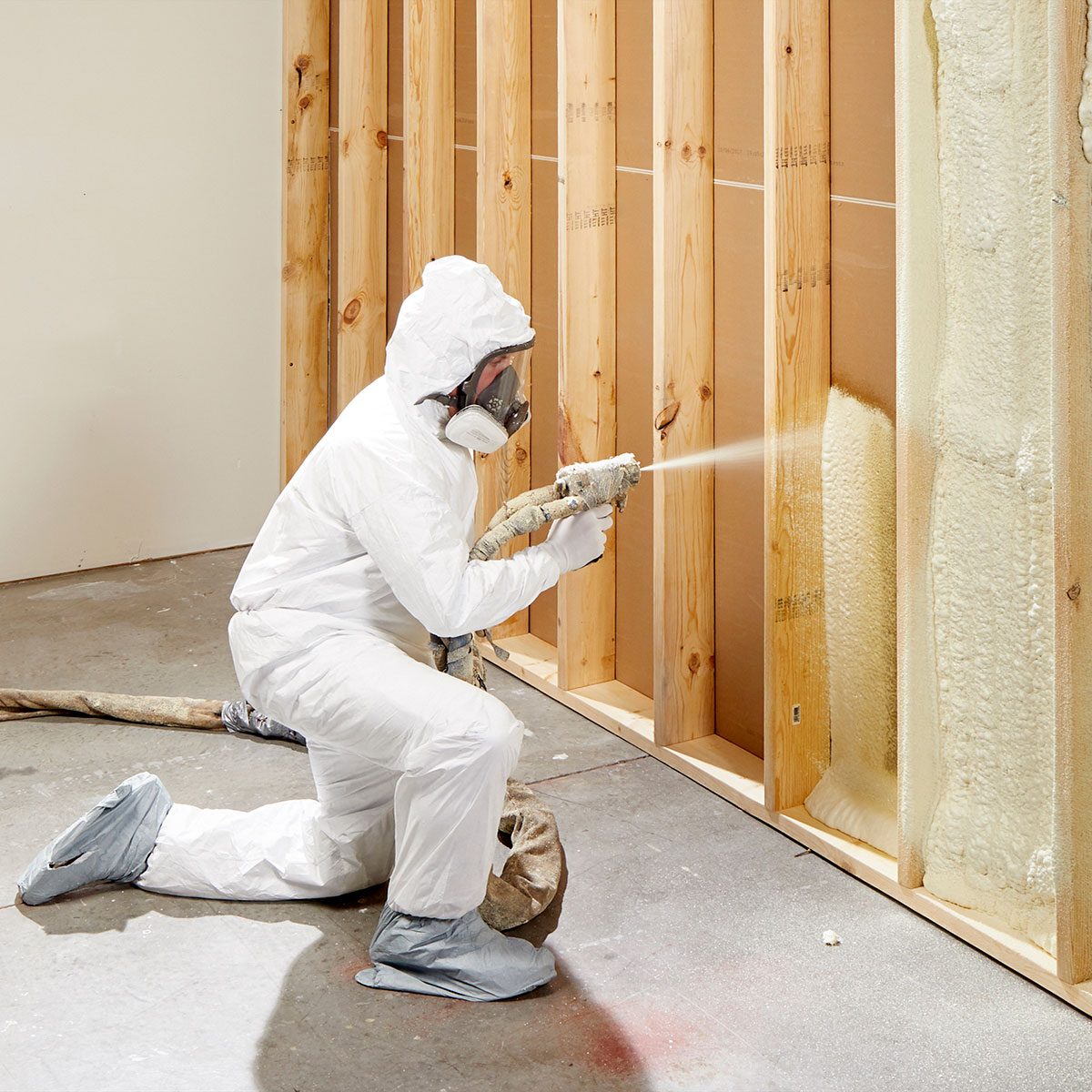The Ecological Impact of Spray Foam: Sustainability Factors To Consider
The Ecological Impact of Spray Foam: Sustainability Factors To Consider
Blog Article
Spray Foam: The Ultimate Solution for Air Sealing and Insulation
Spray foam insulation has actually emerged as a leading option for efficient air securing and thermal insulation, using a special combination of homes that establish it apart from standard methods. Understanding the complete extent of its benefits, setup procedures, and comparisons with other insulation types is vital for making educated choices.
What Is Spray Foam?
Spray foam is a versatile insulation material that integrates the concepts of air sealing and thermal resistance to improve power effectiveness in structures. Made up mainly of polyurethane or various other similar compounds, spray foam is used as a liquid that broadens upon contact with surfaces, producing a strong, continuous layer of insulation. This special property permits it to fill spaces, fractures, and gaps that conventional insulation products may ignore, giving a remarkable air seal.
There are 2 main kinds of spray foam: open-cell and closed-cell. Open-cell spray foam is lighter and a lot more flexible, using superb audio absorption and a lower R-value per inch - Spray Foam. In contrast, closed-cell spray foam is denser, offering a greater R-value, moisture resistance, and added structural stability to developing parts
The application procedure commonly involves specialized devices, making sure a smooth application that complies with numerous substrates, including concrete, wood, and metal. This versatility makes spray foam ideal for both brand-new constructions and retrofitting existing structures. Its capability to produce a closed barrier substantially adds to minimizing energy intake and boosting interior air high quality, consequently making it a favored choice among building contractors and home owners alike.
Benefits of Spray Foam Insulation
One of one of the most substantial benefits of spray foam insulation is its outstanding capability to create a continual air obstacle, which effectively decreases power loss. Unlike typical insulation materials, spray foam increases to fill up spaces and cracks, ensuring that air leak is substantially reduced. This particular not only boosts energy performance but additionally leads to decrease utility expenses with time.
Furthermore, spray foam insulation gives exceptional thermal resistance, adding to an extra secure interior environment. Its high R-value per inch enables efficient insulation in confined areas, making it perfect for attic rooms, wall surfaces, and crawl spaces. The moisture-resistant buildings of spray foam help avoid mold and mildew and mold development, promoting much healthier living problems.
An additional crucial benefit of spray foam insulation is its sound-dampening high qualities (Spray Foam). It properly minimizes sound transmission in between areas, creating a quieter and more comfortable home setting. The sturdiness of spray foam likewise sticks out, as it does not droop or clear up gradually, keeping its performance throughout its life expectancy
Exactly How Spray Foam Works
Understanding how spray foam insulation works is essential for appreciating its efficiency in air sealing and thermal resistance. Spray foam insulation consists of two primary components: isocyanate and polyol resin. When these elements are useful site blended, they undergo a chemical reaction that causes the product to expand quickly, developing a dense foam that fills up splits, tooth cavities, and voids.
As the foam increases, it follows surface areas, forming an impermeable seal that substantially decreases air seepage. This characteristic makes spray foam insulation extremely efficient at preventing drafts and dampness penetration, which can bring about energy loss and damage over time. Furthermore, the closed-cell variant of spray foam supplies exceptional thermal resistance due to its stiff framework, successfully reducing heat transfer.
The one-of-a-kind residential properties of spray foam permit it to adapt to irregular surfaces, making certain detailed insurance coverage and a seamless obstacle. As an outcome, spray foam insulation not just enhances energy performance but likewise contributes to enhanced interior air quality by decreasing the buildup of pollutants and allergens. Inevitably, recognizing the mechanics behind spray foam highlights its function as a premium option for insulation and air securing in both industrial and property applications.
Setup Process Overview

Prior to installment, the space needs to be properly cleaned up and prepped, making certain that surface areas are without dirt, particles, and moisture. This step is critical due to the fact that contaminants can endanger attachment and total efficiency. When the location is prepared, the application involves mixing both parts of the spray foam, which increases upon call and fills gaps efficiently.
Trained specialists need to carry out click to find out more the setup, utilizing specialized equipment to make certain uniform coverage and optimum density. Safety precautions, consisting of using protective equipment and making sure appropriate ventilation, are important throughout this procedure. After application, the foam usually cures promptly, developing a strong barrier that enhances power effectiveness.
Contrasting Spray Foam to Standard Insulation
When assessing insulation alternatives, spray foam insulation stands out in contrast to conventional products such as fiberglass and cellulose. Unlike fiberglass and cellulose, which can enable air seepage, spray foam increases upon application, filling up holes and gaps to create a closed seal.
Additionally, spray foam offers a higher R-value per inch than typical insulation kinds, offering more reliable thermal resistance in a thinner account. This characteristic is particularly beneficial precede with restricted tooth cavity depth. Spray foam is immune to dampness and mold and mildew development, which can be a substantial worry with cellulose and fiberglass, specifically in damp atmospheres.
Nevertheless, spray foam insulation normally brings a higher upfront cost than its traditional equivalents. Home owners have to consider this preliminary investment against lasting power cost savings and performance advantages. Inevitably, while both insulation types serve their objective, spray foam becomes an advanced remedy for modern-day insulation requirements, particularly in regards to air securing and thermal effectiveness.

Conclusion
In recap, spray foam insulation represents a highly efficient solution for attaining optimum air securing and thermal resistance. Its distinct homes, including moisture resistance and sound dampening, make it appropriate for different applications in both brand-new building and constructions and retrofitting tasks (Spray Foam). The initial costs might be greater contrasted to typical insulation products, the lasting advantages, such as considerable energy savings and improved interior air high quality, validate the investment and highlight its value in modern-day structure methods.
Spray foam insulation has arised as a leading remedy for reliable air securing and thermal insulation, providing a special combination of homes that set it apart from standard methods.Spray foam is a functional insulation material that combines the concepts of air sealing and thermal resistance to enhance power performance in structures.When examining insulation options, spray foam insulation stands out in contrast to standard materials such as fiberglass and cellulose. Inevitably, while both insulation types offer their function, spray foam arises as a much more advanced remedy for contemporary insulation needs, especially in terms of air sealing and thermal effectiveness.
In summary, spray foam check that insulation stands for an extremely reliable service for attaining ideal air securing and thermal resistance.
Report this page